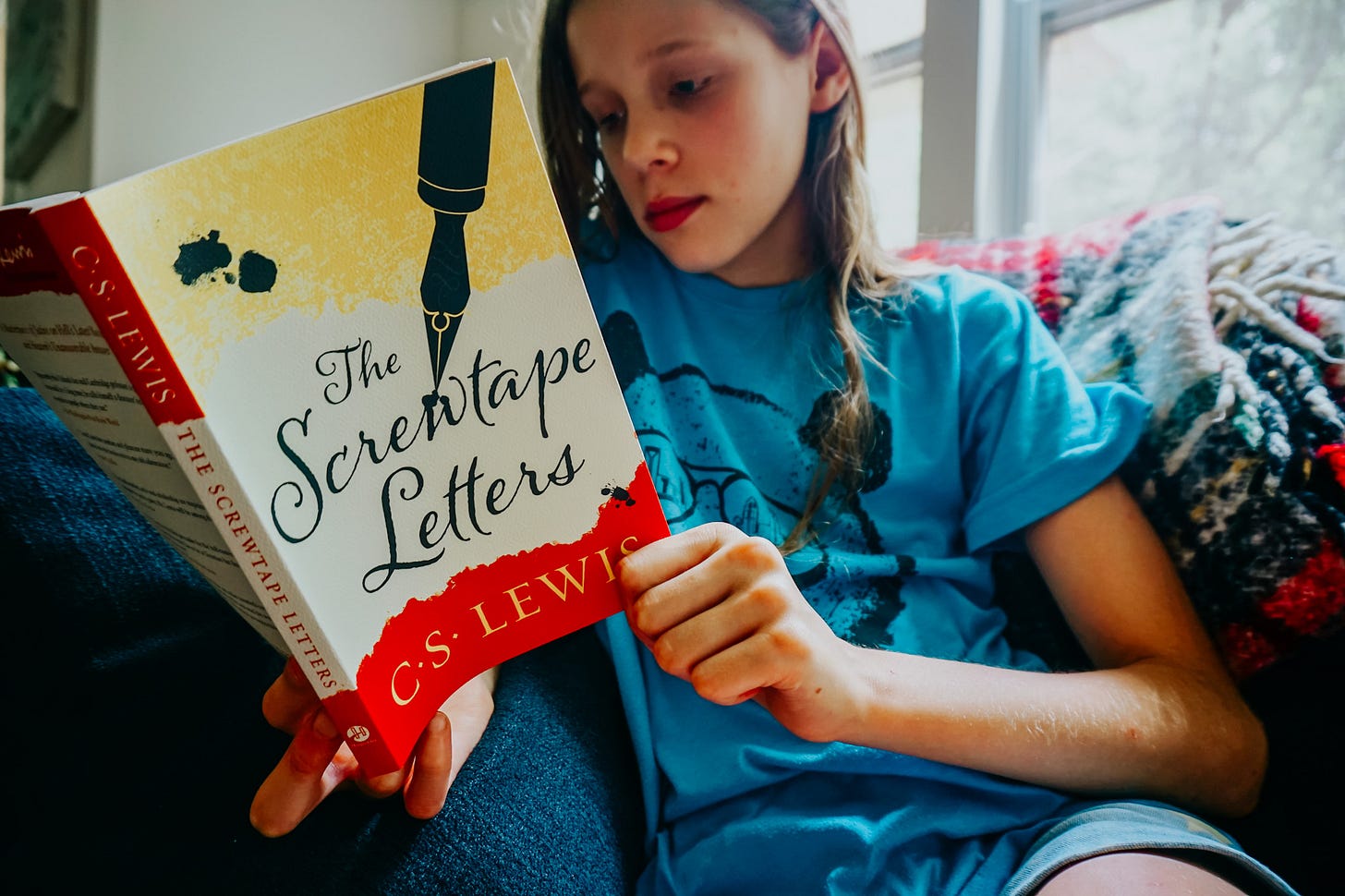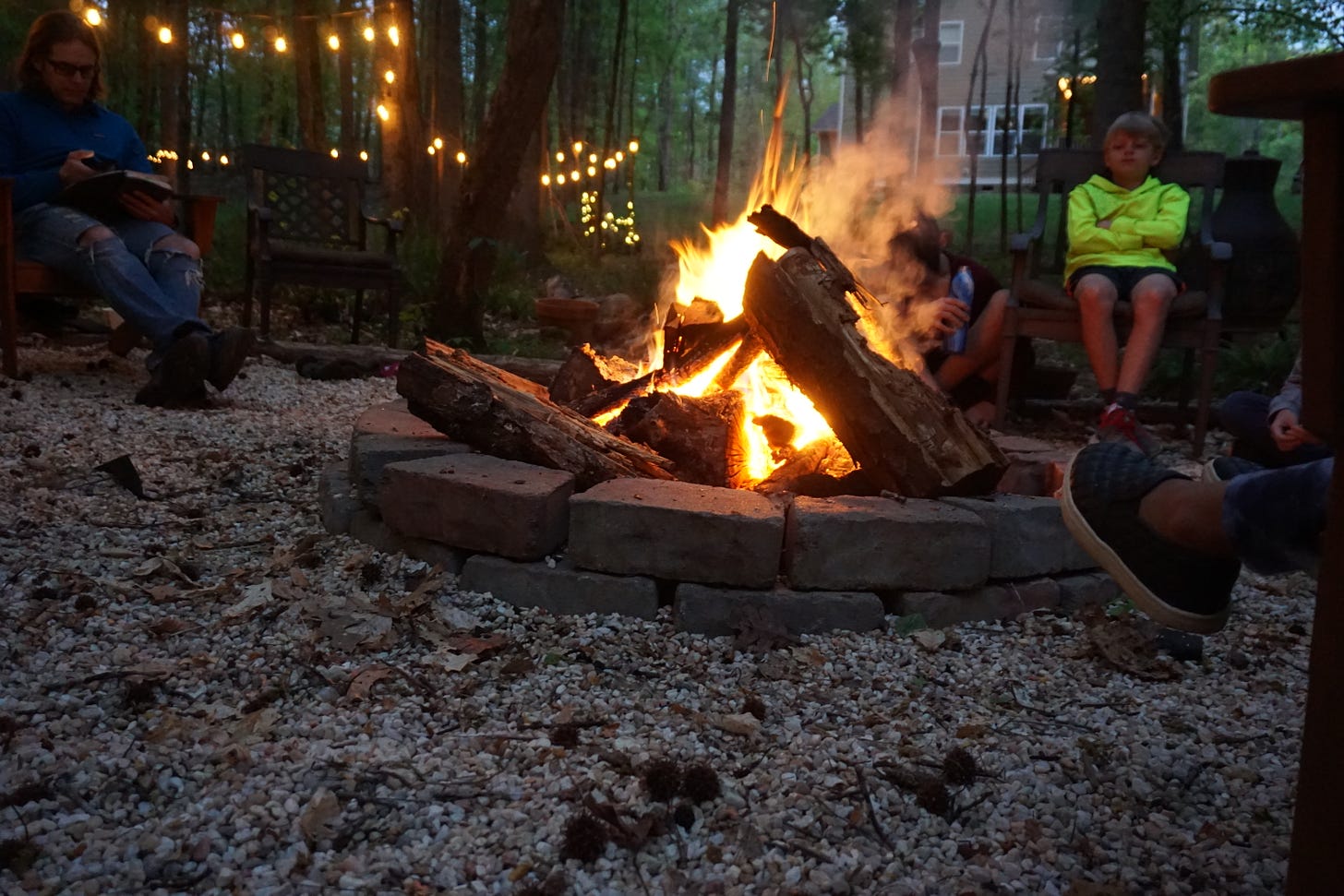How a Spiritual Minimalist Views Wealth
Plus Book Club news & my Secret Shelf in which you learn my research/book secret sauce
Happy Wednesday! My neighbour reminded me last night that Sunday is Father’s Day. If you’re like me and need a quick gift idea, might I suggest a paid subscription to this newsletter?
The Rundown: Some Interesting Stories & Headlines
Ruminating on this in my current research. “The notion that we live in an accidental universe, one that need not be, has had ugly effects in modern history. It suggests that we’re accidents, too, mere embodied stardust. That dumbed-down notion of the human has underwritten a lot of the awfulness of the last two centuries. Astronomy Picture of the Day hints at a different story: None of this is accidental and thus ultimately meaningless. And that includes you, me, and all those who study the heavens and give us the gift of their work.”
What is cultural Marxism and should you care? My answer to the second question? Yes, you should care but not to the point of delving into conspiracy theories about it. No doubt our country teeters in a sort of postmodern moment—one that literally no Christian (Protestant or Catholic) is currently writing about—and we should know and understand the times, not just ape the popular culture and its response to cultural events.
U.S. pride falls to a new low. I don’t take much stock in polls. I think the practice of basing everything we do and how we perceive reality on polling data is one of the great problems of our society. That said, this caught my eye. “American pride has continued its downward trajectory reaching the lowest point in the two decades of Gallup measurement. Although a majority of adults in the U.S. still say they are "extremely proud" (42%) or "very proud" (21%) to be American, both readings are the lowest they have been since Gallup's initial measurement in 2001. Read more.
I’m keeping an eye on censorship these days. Gone is Gone With the Wind. But not everyone thinks it should be censored (“cancelled”). “Among its many black defenders is Whoopi Goldberg, the actor and co-host of The View. Noting that the film was made at a different time, Goldberg warned that banning films like Gone with the Wind and shows like Cops was perilous. Censoring such films, she said, would mean that many popular “blaxploitation” films would also have to be banned.”
Why we should teach children the humanities. The humanities matter because … “Through exploration of the humanities, we learn how to think creatively and critically, to reason, and to ask questions. Because these skills allow us to gain new insights into everything from poetry and paintings to business models and politics, humanistic subjects have been at the heart of a liberal arts education since the ancient Greeks first used them to educate their citizens.

Tim’s Book Club & The Screwtape Letters
Next week my summer book club begins. Are you in? We’ll be reading The Screwtape Letters together for 10 weeks. After that, we’ll take a break, and I’ll announce the next book we’ll read for the fall. Here are details for book club.
+Begins June 22, 2020.
+For next week, read the first three chapters!
+Our first book will beThe Screwtape Letters by C.S. Lewis.
+Each week, I’ll send you an email with some interesting tidbits about Lewis and a little of my own commentary. These email will be succinct, engaging, and designed to provide helpful info as you read Lewis, perhaps for the first time.
+That same week we’ll meet up on “The Thread.”
What’s “The Thread”? It’s an email I send out with questions and discussion prompts about the chapter. All subscribers will be able to engage in this community with their own thoughts and comments about the weeks reading. I’ll post the prompts early in the day so that we can all be commenting and engaging with each other when it’s convenient throughout the day.
Check out what The Thread looks like here.
+We’ll read three chapters a week for ten weeks. Take a big deep breath. These chapters are short and easy to read—not to mention lively and enjoyable.
+The final week will be August 31st.
+The book club will be for all paid subscribers.
+How much is a paid subscription? About the price of two Chick-fil-A cookies and cream milkshakes or buying a Venti Toasted Graham Latte every month.

The Spiritual Minimalist and True Wealth
One of the “Seven Aspects of Spiritual Minimalism” that I wrote about a few weeks ago, encourages us to see the physical and spiritual world as feeding off of each other. Number four reads:
Destroy the Spiritual and Material World Dichotomy - A product of Modernism is that we consider the material world as primary and relegate spiritual to religious times and spaces. This creates a haze on our Christian lens of life and the world in which we live. We don’t see ourselves as participating in a sacred world. Instead, we consume a material one.
So, how can I practically break down this dichotomy in my daily life? For starters, I can change my view of wealth.
John Ruskin, the famous Victorian art critique and artist, defined wealth as "the real appreciative possession of what is good.” With this definition in mind, let's break down some ideas that might help us create homes that are inviting, restful, and beautiful. But first, here are three things you can think through as you set about making your home a place wealthy with rest and love.
1. Reassess Your View of Wealth
Ruskin believed we interpret wealth backwards. We view wealth in our world as the accumulation of things and money. This kind of economy makes sense since it’s what most working governments use. But what about the individual person?
Ruskin challenges us to think about wealth as the possession and appreciation of good things. On Ruskin’s line of thinking, a person does not need to possess certain material goods to be wealthy. Rather, she needs to appreciate the good and beautiful things around her. We become wealthier the more we learn and understand and appreciate those wonderful things already in existence—those good and beautiful things.
This way of thinking smashes our current ideas of what it means to be wealthy. It also reveals that you can possess good and beautiful things, and yet still remain impoverished if you do not take the time to see them.
2. Evaluate What You Desire
What things do I desire? Are they good? Beautiful? Do I seek to understand them? Do I appreciate them? Or does my desire for the profane, the accumulation of things, and money reveal my heart to be truly impoverished? These are not enjoyable questions to think about. But when we do honestly consider them, we might blush at our collective lack of wealth.
3. Reconsider the Value of Spaces
The environments we create and cultivate in our private life, in our public vocations, and in our places of worship matter. Think about your home. I believe beauty in the home must battle with the digital world. If we promote and make our homes focused on digital media and screens then we foster environments of noise, distraction, and isolation, rather than environments of joy, hospitality (invitation), and communion.
Studies show that when you sit down with another person for a meeting or lunch, and you place your phone on the table, you are sending them a psychological message: I’m really not that interested in what you have to say.
If that is true with our interpersonal relationships, think about what the presence of multiple devices or televisions in our gathering spaces communicates to people we invite into our homes (this also applies to gathering spaces for worship, but that’s another rant altogether). Think about the impact such an environment has on the formation of children.
Training Our Affections
Ruskin’s idea of true wealth hearkens to a concept St. Augustine and Aristotle and C.S. Lewis wrote about: ordo amores, or, the training of the ordinate affections. It is simply the idea that when we educate the young, we should help them know and understand the beautiful things they should love and the evil things they should hate.
By helping them value the beautiful and discard the profane, we empower them with right affections so that when they mature they can then nurture themselves, and perhaps one day their own family, with true wealth.
Ok, on to some tips for creating a home space that inspires rest, love, and imagination. (I just through imagination in there because it sounded cool.)
Helpful Tips
What are some simple things we can do to foster environments of beauty? Here are a few ideas we've been experimenting with over the last few years.
1. Introduce the rhythm of gardening into your home. It demands time away from devices, is educational for adults and children, gathers family members around a common goal, and creates a sense of wonder and accomplishment. Start small; a nice 4x8 raised bed, perhaps. See what the presence of growing vegetables does to your spirit and the atmosphere of your home.
Never tried gardening before? No worries. Check out Nicole Burke’s site and jump over that hurdle.

2. Replace screens with a focus on music. We keep instruments in plain view and make them easily accessible. Not a lot, just two or three. Their presence invites exploration and play. Not everyone has a musical background, so exchanging the presence of a television for a great sounding sound system can be a great way to invite joy, dancing, and family fun. Our girls love to create playlists and dance to them.

3. Replace TV time with art, or games. I’m not much of a gamer, so I’ve taken the art route the past two years. I like to use our post-dinner times for watercoloring while Mommy gets some downtime to herself. I blast classical music and paint with the girls. It’s produced some very sweet times of conversation and delight. Not to mention it's developing a love for producing works of art in our girls.

4. Refocus the center of your home. Instead of a TV, make an area for reading. The presence of books can induce a person to sit and read, rather than watch. Create space to talk rather than to surf the internet. This can be as simple as readjusting the furniture and keeping tablets and computers upstairs or away in drawers (or, God forbid, in the trash!).

5. Create delightful outdoor spaces. Did you know 25% of Americans spend the entire day indoors? A shocking statistic. With that in mind, create an area in the backyard where you might go read a book or relax with your family. The fire pit is our favourite. But it’s also amazing what an ENO or Kammok hammock can do. In our last house, all I had to do was set up my hammock, which takes 60 seconds, and the girls came running. They’d play in it for hours or just sit with him in it. The idea is to make the rhythm of your home one that fluctuates from inside to outside, rather than just inside.

The Secret Shelf: In Which I Divulge My Book and Research Secrets
For the past three months, I’ve been meeting with over a dozen men via zoom for a bible study on the New Testament book of Revelation. I know, I know. Who would want to study that book right now?
Well, believe it or not, I love this book. Always have. And the more I read it, the more it unfolds in m heart. I highly recommend studying it on your own. My friend, who led the study, began by reading this verse from chapter one:
Blessed is the one who reads aloud the words of this prophecy, and blessed are those who hear, and who keep what is written in it, for the time is near.
John, the writer—and yes, I’m in the camp that believes John the Beloved Apostle wrote this book—proclaims that you are blessed if you read this book aloud. It was written to be read aloud by the early churches in their gatherings. Imagine what might happen if we did the same in our churches. Can you imagine your pastor walking up to the pulpit and saying, “Okay everyone, for the next few weeks, I’m just going to read the book of Revelation out loud.”?
The book is divided into three theophanies encountered by John in his vision. Over and over, the epic narrative is interrupted by songs out of heaven, sung by angels and martyred Christians and crazy heavenly creatures. But the focus of the book is worship. And it directs the reader to view God in his transcendence and glory. It ends with a sweeping view of God finally banishing evil so that he can once again dwell with the human race:
Behold, the dwelling place of God is with man. He will dwell with them, and they will be his people, and God himself will be with them as their God.
Are you kidding me? It’s the final chapter of our faith described in the most beautiful language you can think of. Here’s how one of my favourite theologians, Richard Baukham describes the holy city of God.
But the city which is permeated with the divine holiness is also filled with the divine splendour. It needs neither sun nor moon nor lamp, for it has the glory of God reflected in the radiance of its own multicoloured translucence. Creation has thus a moral and religious goal—its dedication to God fulfilled in God’s holy presence—and also an aesthetic goal—its beauty fulfilled in reflecting the divine glory. The new creation, like the old, will have its own God-given beauty but will be even more beautiful through its evident reflection of God’s own splendour.
In a couple of weeks, I’ll be telling you another reason why I’ve been studying Revelation. Can’t wait!
Ok, without further adieu, here are a few resources I’ve found insightful and inspiring to read along with Revelation. Keep in mind, I did not read all of these books in this three month period. I’ve read a few of them over the past few years and others, like the big commentaries, I dip into all the time. Here we go:
The NIV and The New Oxford Annotated Bible and the ESV Bible. I like to use several translations when I study. For my daily reading of Scripture, I use the old NIV that my church gave to me when I graduated from high school. I’m not going to tell you how long ago that was. KEY: When it comes to Bible reading, don’t read what you ought to read, read what feels good to your sensibilities.
Reversed Thunder, by Eugene Peterson - This book a dear friend of mine recommended to me. She said it helped her get beyond some of the baggage she had from growing up in a church that taught revelation in a more narrow fashion. I agree. Eugene sure could write. And you will not be disappointed with this book. It’s more inspirational and devotional than it is academic, and that’s a good thing. You should never just consult one source or one type of source when engaging in deep bible study. I always tell people to reference at least three works at minimum, and one of those should be from a perspective that you probably don’t agree with. Strive for a balanced sampling of biblical insights, while praying for the Holy Spirit to guide you in your pursuit of truth and wisdom.
The Theology of the Book of Revelation, by Richard Bauckham - Bauckham is a world-class biblical scholar. He’s forgotten more about the bible than I’ll remember in a lifetime. He may skew toward some different academic positions you may not agree with, like the authorship of Revelation for example. But that’s okay. He’s a master and I always learn new things when I dive into his theological work. I believe him to be the pre-eminent scholar on Johannine literature. But that’s just me. This is not an everyman read. It’s an academic book and requires patience. But the rewards are many. (see above excerpt)
Words of Delight, by Leland Ryken - Wow. This is a secret sauce book if ever there was one. This book is not about just the book of Revelation. It’s about how to read the Bible as literature. It discusses the various genre’s found in scripture and the final chapter is all Revelation. If you want a fantastic addition to your theological library, you’ll love this book and use it often. And the final chapter is worth the price of the book. You’ll get his insight in Revelation as a work of epic poetry, which will help mold your own perspective in a new fresh way. This book is in the middle of the spectrum. I’ll say it’s lay-academic. Everyone can learn from it, and Ryken is such a good writer, you won’t realize the big chunks of theological meat you're consuming.
The New Bible Commentary - Conservative commentary. D.A. Carson (PhD Cambridge) is one of the editors. What more do you need to know? This is a solid commentary and worth to be on your shelves, or on your computer.
Tyndale Commentary - Excellent, classic, and shorter-length commentary.
IVP New Testament Commentary - Bestselling commentary from InterVarsity Press, authored by Craig Blomberg (PhD University of Aberdeen), a renowned New Testament scholar.
You Need to Read More Fiction
And by more, I mean mine. :) I’d love for you to join me and our fun little community of fiction readers and writers as we follow the adventures of Will Taylor and his quest to save the world by saving the mysterious young woman, Aylin.



There are few sources that I trust and find a worthwhile investment of my time and attention. Further Up gives me inspiration and motivation to learn more, live well, and thoughtfully reflect and ponder the deeper and more meaningful spiritual elements of life with God. Love the new format and all the hard work and research that goes into developing the material. And thanks for sharing some of your 'secret sauce'! Can't wait to see what else is hidden in your bookshelves.